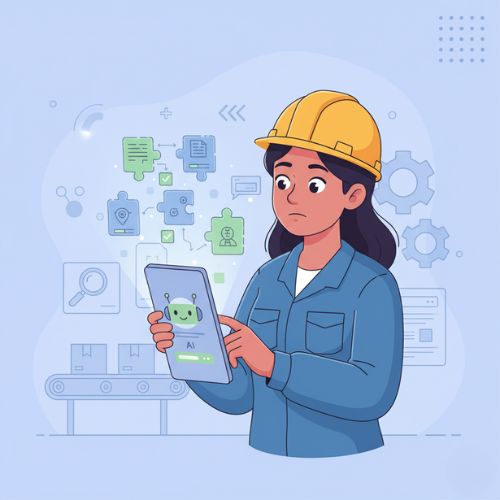Using AI as a QA Training Management Solution
QA professionals handle complex processes, and standard operating procedures form the backbone of their work. Keeping everyone up to date on these procedures ensures consistent quality and reduces errors. Yet, managing training often brings its own set of hurdles.
In quality assurance, where precision is crucial, AI tools provide new approaches to training. These tools can be customized to meet individual needs, track progress, and make learning more engaging and interactive. For QA teams dealing with SOPs, this means smoother operations and better outcomes. This post explores how AI fits into training management, with a focus on SOPs for QA professionals.
We'll examine common challenges, explore how AI addresses them, and provide hypothetical examples to illustrate its application. Along the way, we'll draw on real data to highlight the benefits.
Common Challenges in SOP Training for QA Teams
QA professionals know that SOPs guide everything from inspections to audits. But training on these documents isn't always straightforward.
One issue is the sheer volume of information. SOPs can run dozens of pages, covering detailed steps for compliance with standards like ISO 9001 or ISO 13485. New hires might feel overwhelmed, while experienced staff need refresher sessions to stay sharp.
Retention often falls short in traditional training methods. Lectures or reading assignments don't always stick. Without reinforcement, key details slip away, leading to mistakes on the job.
Scheduling adds another layer of difficulty. QA teams work across shifts or locations, making it difficult to arrange group sessions. This can delay training and leave gaps in knowledge.
Tracking completion and understanding pose problems as well. Managers often rely on sign-off sheets or quizzes, but these tools don't always accurately reflect true comprehension. If someone passes a test but later forgets the material, quality suffers.
Finally, updating SOPs creates ongoing needs. When procedures change due to regulations or process improvements, retraining the whole team takes time and resources.
These challenges underscore why many QA departments seek more effective approaches. AI steps in here, offering tools that make training more targeted and effective.

How AI Enhances SOP Training Management Solutions
AI brings smart features to training, especially for SOPs in quality assurance. It utilizes data to personalize learning and automate certain aspects of the process.
At its core, AI analyzes user interactions to tailor content. For instance, if a QA analyst struggles with a specific SOP section, the system can provide extra examples or quizzes on that topic.
Microlearning breaks down SOPs into bite-sized pieces. Instead of tackling a full document at once, employees learn one step at a time through short modules. This fits busy schedules and improves recall.
AI also handles tracking automatically. It logs who completes what, flags areas of difficulty, and generates reports for managers. This gives a clear view of team readiness without manual effort.
Natural language processing lets AI answer questions in plain terms. A QA professional might ask, "What's the protocol for handling deviations?" and get an instant, accurate response based on the latest SOPs.
Integration with existing systems amplifies this. AI can pull from quality management software, ensuring training aligns with current procedures. For more on integrating AI into quality systems, check out Integrating Artificial Intelligence into Your QMS.
In short, AI turns static SOP documents into dynamic learning experiences.
Hypothetical Examples of AI in Action for QA SOP Training
To illustrate this, consider the following scenarios drawn from typical QA settings.
Example 1: Onboarding a New QA Analyst in Manufacturing
Imagine a medical device company onboarding Sarah, a new analyst. Traditionally, she'd spend days reading SOPs for quality inspections.
With AI, the system assigns a personalized path. It starts with basics, like "How to document non-conformances." Sarah interacts via a chatbot, asking questions like "What if the deviation is minor?" The AI draws from the SOP and provides an explanation.
Progress tracking indicates that Sarah has aced inspections but needs improvement in audits. The tool schedules microlearning sessions. In two weeks, she will be fully trained, which normally takes a month. This aligns with AI accelerating SOP development, as noted in The Writers For Hire's Smart Future of SOPs.
For more on AI in medical device QMS, see Medical Device Quality Management System Chatbot.

Example 2: Refresher Training After SOP Updates in Pharma
A pharmaceutical firm updates SOPs for compliance with new regulations. Mike, a veteran QA lead, must learn the changes.
AI scans the updates and creates targeted quizzes. It sends notifications via Slack integration: "Review the new section on root cause analysis." Mike uses voice input for convenience.
The system tracks his completion and tests retention a week later. If he falters, it offers more practice. This prevents errors in audits. Data supports this, with AI improving satisfaction by 25% through quick feedback .
Explore AI for root cause analysis in AI Root Cause Analysis.
Example 3: Team-Wide Training for a Global QA Department
A multinational company has QA teams in different time zones. Coordinating live training is tough.
AI deploys a shared platform where employees access SOP modules anytime. It translates content for non-English speakers, overcoming language barriers.
Managers get dashboards showing completion rates and weak areas. For instance, if deviation recording lags, AI pushes group challenges. This fosters consistency across sites.
Hypothetically, error rates drop 15%, echoing broader AI benefits in QA .
For overcoming language issues in SOPs, read Overcoming Language Barriers in SOPs with AI Chatbots.
These examples illustrate AI's flexibility in real QA contexts.
Implementing AI for SOP Training in Quality Assurance
Getting started with AI requires planning. QA professionals can follow these steps.
- Assess Current Training Needs: Review existing SOPs and identify pain points. Survey the team on what works and what doesn't.
- Choose the Right AI Tool: Look for features like chatbot integration and analytics. Botable.ai offers solutions tailored for quality assurance, including SOP management. Visit Botable.ai Departments Quality Assurance for details.
- Integrate with Existing Systems: Connect AI to your QMS or communication tools like Microsoft Teams. This ensures seamless updates. Learn more in Microsoft Teams.
- Pilot and Iterate: Start small with one SOP area, like inspections. Gather feedback and adjust.
- Train the Trainers: Equip managers to use AI dashboards for oversight.
Privacy matters too. Ensure the tool complies with data standards, as discussed in Using AI for Compliance.
With these steps, QA teams can roll out AI smoothly.
AI's Role in Continuous Learning for QA
Training doesn't end after initial sessions. AI supports ongoing development in quality assurance.
It enables feedback loops where employees report SOP issues via chat. AI aggregates this for improvements, closing the gap between procedures and practice.
For microlearning in QMS, AI delivers daily tips. This keeps SOPs top of mind. See QMS Employee Microlearning.
In audits, AI preps teams by simulating questions. This builds confidence and ensures compliance.
Overall, AI fosters a culture of continuous improvement, vital in QA.
Potential Drawbacks and How to Address Them
No tool is perfect. AI may misinterpret queries if not properly trained. Solution: Use high-quality data inputs.
Dependency on tech could arise. Balance with human oversight.
Cost is a factor, but savings from reduced errors offset it. Gartner's note on 20% labor savings applies here.
Addressing these keeps AI beneficial.
AI's Growing Impact on QA Training
As AI evolves, its role in SOP training will expand. Features like virtual reality simulations could emerge, making learning immersive.
For now, tools like chatbots provide solid foundations. QA professionals can leverage them to stay ahead.
In quality assurance, where details count, AI offers practical support for training management.
Answers your employees need, right when they need them
Meet Botable — the AI chatbot that handles everything from simple FAQs to complex, multi-step questions, so your team can focus on what matters. Built for HR, QA, and beyond.
Continue reading
Ready to see what Botable can do for you?
Book your demo now to see how Botable can transform your workplace.
Identify your unique challenges
Flexible pricing options
Easy integrations
Step-by-step implementation plan
Customize Botable for your workflow
Book a demo
.webp)









